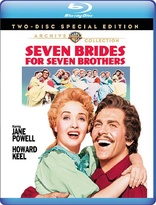Seven Brides for Seven Brothers Blu-ray Movie
HomeSeven Brides for Seven Brothers Blu-ray Movie 
Two-Disc Special EditionWarner Bros. | 1954 | 1 Movie, 2 Cuts | 102 min | Rated G | Jun 05, 2018
Movie rating
7.2 | / 10 |
Blu-ray rating
| Users | 4.5 | |
| Reviewer | 5.0 | |
| Overall | 4.5 |
Overview
Seven Brides for Seven Brothers (1954)
In 1850 Oregon, when a backwoodsman brings a wife home to his farm, his six brothers decide that they want to get married too. Filmed in both 2.55 and 1.75
Starring: Jane Powell (I), Howard Keel, Jeff Richards (I), Russ Tamblyn, Tommy RallDirector: Stanley Donen
| Romance | Uncertain |
| Musical | Uncertain |
| Family | Uncertain |
| Comedy | Uncertain |
| Western | Uncertain |
| Drama | Uncertain |
| Adventure | Uncertain |
Specifications
Video
Video codec: MPEG-4 AVC
Video resolution: 1080p
Aspect ratio: 2.55:1
Original aspect ratio: 2.55:1
Audio
English: DTS-HD Master Audio 5.1 (48kHz, 24-bit)
Alternate "flat" widescreen version is DTS-HD Master Audio 2.0
Subtitles
English SDH
Discs
Blu-ray Disc
Two-disc set (2 BDs)
Playback
Region A, B (C untested)
Review
Rating summary
| Movie | 5.0 | |
| Video | 5.0 | |
| Audio | 5.0 | |
| Extras | 4.5 | |
| Overall | 5.0 |
Seven Brides for Seven Brothers Blu-ray Movie Review
The Little Musical That Could
Reviewed by Michael Reuben June 4, 2018Seven Brides for Seven Brothers is one of the most popular movie musicals ever made. It was a
sleeper hit for MGM in 1954, which had such low expectations that it repeatedly cut the film's
production budget—only to be shocked when Seven Brides outperformed its prestige musical
release of that year, Brigadoon. Theatrical
reissues, TV broadcasts and home video incarnations
have expanded the film's fandom far beyond its initial reception, and some of its fans are as
fanatical as any Star Wars devotee. In his disc commentary, director Stanley Donen tells the story
of an Englishman whose wife left him because he insisted on playing his VHS cassette of Seven
Brides every night when he got home. Apparently she was tired of competing with the Pontipee
clan for her husband's attention.
Seven Brides has been one of the most requested titles since the Warner Archive Collection
began releasing Blu-rays in 2012. WAC would have been happy to release it sooner, but as is so
often the case with popular titles, there were major obstacles to producing a hi-def version of
sufficient quality to satisfy WAC's high standards and fans' legitimate expectations. For a full
account, please see the "Video" section below.
As compensation for the long wait, WAC has included a special extra with this release: a new
transfer of the alternative "flat" version of Seven Brides that MGM required Donen to shoot as a
hedge against the possibility that theaters might not be able to play the new CinemaScope format.
Little seen until its release as a laserdisc extra, this curiosity has been freshly scanned for its first-ever 1080p presentation. While it hasn't been
restored to the level of the film's scope version, it's
eminently watchable and included at no extra charge. (The two-disc Seven Brides carries the
same list price as WAC's single-disc titles.)
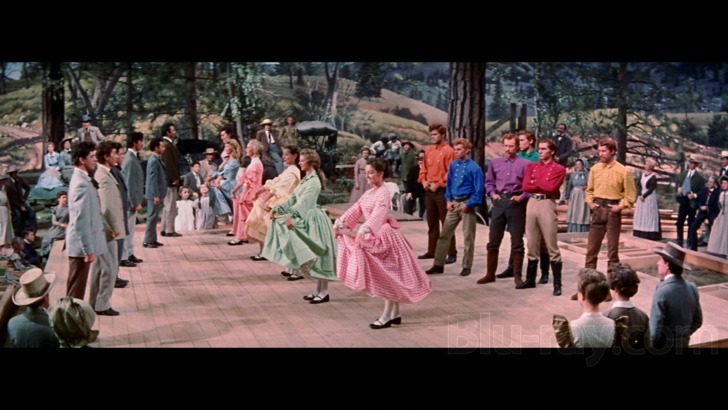
The seven brothers of the title are the Pontipees, a family of red-headed farmers on an isolated spread in the mountainous Oregon Territory of 1850. The brothers' dearly departed parents christened them alphabetically with names from the Bible: Adam (Howard Keel), Benjamin (Jeff Richards), Caleb (Matt Mattox), Daniel (Marc Platt), Ephraim (Jacques d'Amboise), Frank (Tommy Rall)—which is short for "Frankincense"—and Gideon (Russ Tamblyn).
As the film opens, Adam is driving his wagon into town, intent on acquiring two things: supplies and a wife. His notion for the latter is anything but romantic; one infers that the Pontipee parents were too busy working the land and producing babies to invest any effort in teaching their boys social graces, cooking skills or basic hygiene. Adam is looking for someone to take charge of those traditionally feminine tasks, and his eyes light upon Milly (Jane Powell), whom he first sees chopping wood and whose cuisine he samples approvingly at the local tavern. In the first of Seven Brides' many fairytale conveniences, Adam and Milly are a classic case of love at first sight, and Milly has no living relatives to object to their union. When Adam returns to the Pontipee farm with Milly beside him, the two are newlyweds.
But Adam neglected to mention to Milly that she was acquiring both a husband and six brothers-in-law. After the initial shock has worn off, Milly takes Adam and his brothers in hand with the proverbial iron first inside a velvet glove. She cleans them up, teaches them manners and so effectively transforms the family that all six brothers are able to win the hearts of a comely collection of townsgirls at a local barn-raising: Dorcas (Julie Newmar, the future Catwoman, then still credited as "Julie Newmeyer"), Ruth (Ruta Lee), Martha (Norma Doggett), Liza (Virginia Gibson), Sarah (Betty Carr) and Alice (Nancy Kilgas), the parson's daughter who is Milly's best friend. Unfortunately, the ladies' existing suitors from town don't take kindly to competition from the Pontipee boys, and the barn-raising festivities collapse in a brawl, along with the barn.
In a plot turn that may be hard for some modern viewers to swallow, Adam advises his brothers to emulate the Romans, whose abduction of the Sabine women he has been reading about in one of Milly's books. (In Adam's account, they're called "Sobbin' Women", which is the title of the Stephen Vincent Benét short story on which the film is based.) The brothers slip into town at night and kidnap all six women, fleeing homeward through Echo Pass and triggering an avalanche behind them to block pursuit by the furious families. An appalled Milly banishes the brothers to the barn for the winter, while she shelters the ladies in the main cabin. As the long Oregon winter stretches into the new year, many things change on the Pontipee farm. When the snows finally melt so that the townspeople can get through, they find that their vengeful impulses have to be put aside. (The conclusion depends on a comic variation of "I'm Spartacus!")
As with most great movies, it's impossible to pin down exactly what makes Seven Brides so enduring and effective. The script by Albert Hackett and Frances Goodrich (who wrote Easter Parade), with additional work by Dorothy Kingsley (who adapted Kiss Me Kate) is a neatly structured model of narrative efficiency. The original songs by Gene de Paul and Johnny Mercer are both tuneful and clever. The choreography by Michael Kidd, whose arm Donen had to twist to get him involved, is a unique combination of dance, acrobatics and physical comedy (best exemplified by the infectiously energetic barn dance sequence). The casting is flawless, anchored by the two leads, with Keel giving one of his best performances as Adam, exuding an irresistible charm that makes both Milly and the audience willing to forgive his many mistakes. Powell’s Milly is a career-best for the actress, a unique combination of grit and gentility that lets her slip into the role of family matriarch without hesitation or opposition.
Donen has repeatedly bemoaned MGM's budget cuts that prevented him from shooting Seven Brides on location. Except for a few inserts, all of the mountain and countryside vistas are painted backdrops or optical superimpositions, and they're glaringly obvious, especially in the superior resolution of WAC's new Blu-ray presentation. With due deference to the director, I would argue that the artificiality of these views enhances the film rather than detracting from it. Their storybook-illustration quality contributes to Seven Brides' sense of fantasy, which is essential to the film's charm. Only in an alternate reality bordering on magical realism could a group of rough-hewn backwoodsmen be so easily transformed into dashing beaus and devoted husbands. They're seven frogs at the outset, but by the end they've all become princes.
Seven Brides for Seven Brothers Blu-ray Movie, Video Quality 
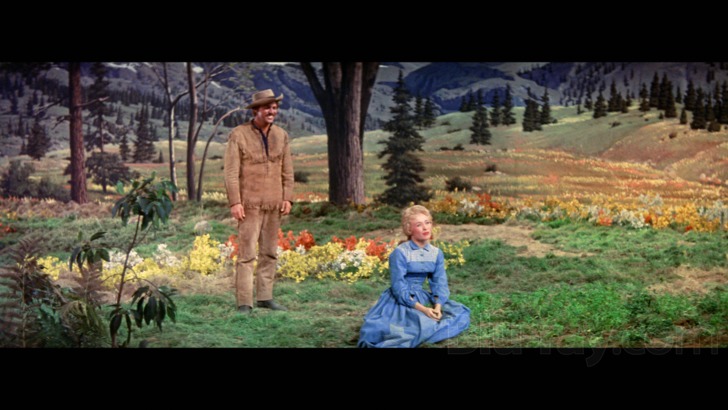
Seven Brides for Seven Brothers was shot by George J. Folsey (Meet Me in St. Louis), whose
widescreen cinematography was nominated for an Oscar, one of thirteen that Folsey amassed in
his distinguished career (though he never won). Folsey shot the film on the finicky stock known
as Ansco Color, which was much admired for its chromatic intensity but was ultimately
supplanted by Kodak's products. Seven Brides' journey to Blu-ray was hampered by the fact that
the negative was severely damaged—"shredded" was how one person familiar with the element
described it—in the late Sixties, when MGM used it to make 70mm blowups. Even now, with
today's sophisticated digital tools, it is uncertain whether the negative could ever be restored (and
even if it could, the cost would be prohibitive).
All current broadcast and streaming versions of Seven Brides, as well as previous home video
versions, have been based on an interpositive created photochemically in the mid-Nineties by
YCM Laboratories, which cobbled together elements from a variety of sources to generate a
complete IP. The quality was variable, and comparison to an archival dye-transfer Technicolor
print confirmed that the colors were far from accurate, but for over twenty years, YCM's creation
was believed to be the best available source. After reviewing that element, WAC determined that
it was simply inadequate by current Blu-ray standards. (A less exacting publisher might have
simply cleaned it up and slapped it on disc, as Universal did recently with For Whom the Bell Tolls.)
An exhaustive search was undertaken for an alternative source—a lengthy process, because each
potential element has to be retrieved from far-flung archives and minutely examined. Eventually
an IP was found in a Pittsburgh storage facility that, when the film cans were opened and the
contents reviewed, was revealed to date from the period before the negative was damaged.
Having never been properly catalogued, this IP had apparently sat in storage for over fifty years,
untouched until WAC pulled it for examination. Warner's Motion Picture Imaging facility has
scanned this newly unearthed IP at 2K, followed by color correction using the dye-transfer print
as a reference and WAC's usual thorough cleanup (even an unused element picks up dust and
minor damage).
The resulting 1080p, AVC-encoded Blu-ray is a presentation of Seven Brides that amply rewards
fans' wait for this beloved film. The colors are eye-popping, whether it's the bright shades of the
shirts that differentiate the brothers after Milly has finished their makeover, or the intense hues
of the flowery field where she picks sorrel (and sings about the thrill of being newly married), or
the cheerfully bright household into which she transforms the Pontipee farmhouse. Color
unavoidably shifts during dissolves, but MPI has managed to minimize the disruption. The
whites of the snow that blanket the countryside are suitably bright, even though the snow itself is
mostly fake. (According to Donen's commentary, the miniature avalanche engineered for the film
was so good that it was reused in many subsequent films. It still looks convincing.) Blacks are
appropriately dark. Detail and sharpness are consistently superior, a quality that is all the more
noteworthy because Seven Brides was shot with some of the earliest CinemaScope lenses, which
were notorious for softening whatever they photographed. The film's grain field is visible but
finely rendered, although it unavoidably coarsens in scenes involving opticals (e.g., the opening
titles).
WAC has formatted Seven Brides at the original CinemaScope aspect ratio of 2.55:1, and it has
given the disc its usual careful mastering, with an average bitrate of 34.99 Mbps.
(Note: The final seven screenshots accompanying this review are from the "flat" version
discussed in "Supplements".)
Seven Brides for Seven Brothers Blu-ray Movie, Audio Quality 
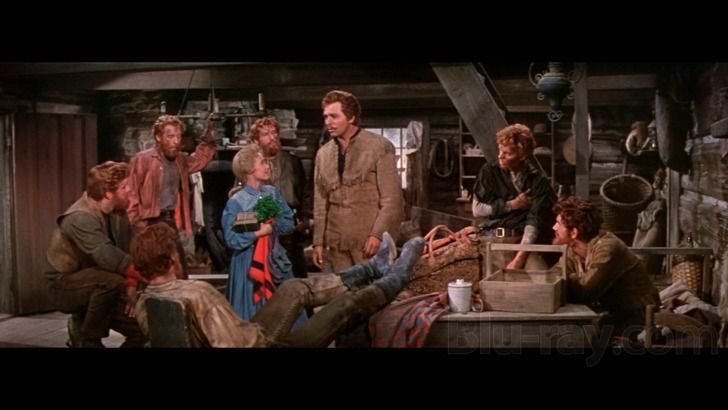
Seven Brides was originally released in both mono and four-track stereo. For the film's DVD
release, the Warner sound department created an entirely new 5.1 mix using the original music
stems, as well as dialogue and effects tracks from a variety of sources. The four-track stereo
version served as a reference for the positioning of voices and effects between left and right. That
same remix appears on the Blu-ray, but now encoded in lossless DTS-HD MA 5.1.
The disc's sonic experience is as richly rewarding as its visual presentation, with an exquisite
reproduction of the mammoth studio orchestra from MGM's golden era (celebrated in the MGM
Jubilee Overture extra) and superb fidelity for the vocal performances. The effects editing is
detailed and precise—listen to the barn-raising sequence for a fine example—and the dialogue is
always clear and correctly positioned. Music supervisor Saul Chaplin (West Side Story) oversaw
the transformation of Gene de Paul's melodies into orchestrations that are as lovely as the songs
themselves.
Seven Brides for Seven Brothers Blu-ray Movie, Special Features and Extras 
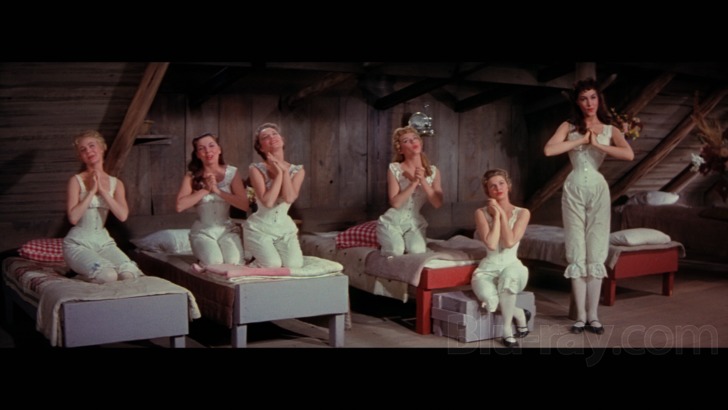
The extras have been ported over from Warner's 2003 DVD and 2004 two-disc DVD special
edition of Seven Brides. The only dropped extra is the trailer gallery for additional Stanley Donen
musicals. (Preliminary cover art erroneously listed the trailer gallery as an extra, and some copies
of that mistake may have slipped into retail product.)
- Commentary by Stanley Donen (disc 1): Donen was 80 when he recorded this commentary, but he was still a lively conversationalist, although pauses grow longer as the film proceeds. Much of the same subject matter is covered in the "Sobbin' Women" documentary, but Donen has a few anecdotes of his own, including the Englishman whose wife left him over his devotion to Seven Brides.
- Sobbin' Women: The Making of Seven Brides for Seven Brothers (disc 1) (480i; 1.33:1; 43:25): Directed by Scott Benson (You Must Remember This: A Tribute to Casablanca), this documentary was originally created for the laserdisc release of Seven Brides, but it was expanded for the 2004 DVD to include additional interviews. Howard Keel hosts and narrates. The array of participants is truly impressive, including Jane Powell, Stanley Donen, other members of the cast and choreographer Michael Kidd.
- 7/22/1954 Radio City Music Hall Premiere (disc 1) (480i; 1.33:1; 1:54): Narrated by Howard Keel, Stanley Donen (using excerpts from his commentary) and Jane Powell.
- MGM's 30th Anniversary Newsreel (disc 1) (480i; 1.33:1; 2:07): Narrated by Jane Powell and Ann Miller
- Vintage Short Subject: MGM Jubilee Overture (disc 1) (1080p; 2.55:1; 9:44): In this 1954 short, MGM celebrates its 30th anniversary with a performance by its studio orchestra playing a medley of some of its best-known movie themes. WAC has remastered this musical tribute in 1080p and DTS-HD MA 5.1.
- Trailer (disc 1) (1080p; 2.55:1; 4:24): Also remastered in 1080p.
- Alternate Widescreen Version (disc 2) (1080p; 1.78:1; 1:41:51): In both Donen's
commentary and the Sobbin' Women documentary, the director describes how MGM
required him to shoot two versions of Seven Brides simultaneously, because the studio
was nervous about the new CinemaScope format. According to Donen, this "flat" version
was never used, although it probably did play in a few theaters, both in the U.S. and
abroad. Warner first presented it on home video in a 1999 two-disc laserdisc set, then
issued it again in 2004 on DVD. For this Blu-ray edition, the existing element has been
newly scanned by MPI at 2K, although the master has not been subjected to the same
degree of color correction and cleanup as the main feature. Indeed this new 1080p
presentation serves as an instructive demonstration of just how much work is required to
create WAC's usually pristine masters.
Colors on this version aren't as brilliant as on the CinemaScope version, and their stability and density fluctuate from scene to scene, and even within a scene. Some sequences fare better than others; the barn-raising dance holds up nicely, but Adam's initial trip into town singing "Bless Your Beautiful Hide" pulsates with shifting hues and intensities. A few scenes have clearly been taken from dupes, and MPI hasn't done its usual massaging to ease the transitions. Dust and print damage are abundant; while none of the flecks and specks are disastrous, they're all the more noticeable if you've become accustomed to not seeing them at all. WAC's presentation of the alternate Seven Brides serves as a stark reminder that the quality of a film-to-video transfer is also reflected in what you don't see. (I have been told that, had WAC invested the time and money to bring the flat version's quality up to the same level as the CinemaScope original, it would not have been able to offer Seven Brides at its usual single-disc pricing.)
The flat version is also a fascinating study in alternative composition and staging. To my eye, there is frequently too much dead space at the top, as Donen and his DP are forced to crowd multiple figures into a squarer shape. The CinemaScope aperture also allowed Donen to separate the brothers (and later their brides) more effectively within a crowded frame, giving a sense of scale and scope even to intimately domestic scenes that is missing in the flat version. Major dance sequences, especially the competition that precedes the barn-raising, play better in the wider frame. Perhaps if the film had been conceived from the outset for a narrower ratio, these limitations would have been overcome, but Donen had to restage each scene using sets and choreography designed for a much different shape.
The sound on the alternate version is mono, encoded as DTS-HD MA 2.0. I have been told that the music track was modified to create some degree of stereo separation, but to my ear it is so slight as to pass unnoticed.
Seven Brides for Seven Brothers Blu-ray Movie, Overall Score and Recommendation 
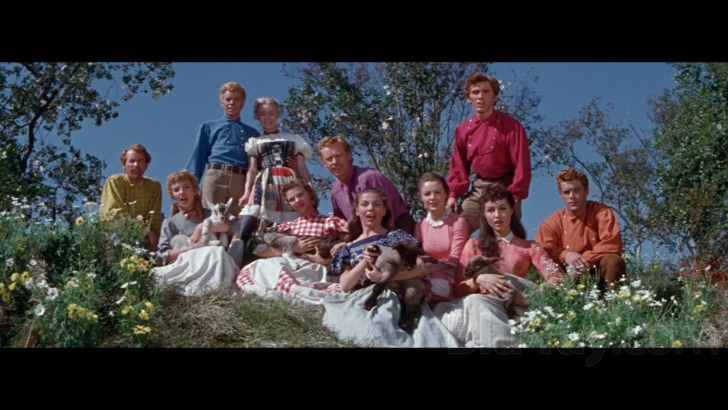
Seven Brides for Seven Brothers is a classic demonstration of screenwriter William Goldman's
declaration that, in the movie business, nobody knows anything. The movie wasn't supposed to
succeed, but it did. Audiences weren't supposed to accept backwoods bumpkins singing and
dancing, but they did. Viewers, especially the female ones, weren't supposed to excuse Adam for
lying to his bride and forgive his brothers for abducting theirs by force, but they do. And the
damage to the film's negative meant that there was never going to be a great Blu-ray
presentation—but WAC has made one. Highest recommendation.
Similar titles
Similar titles you might also like

The Music Man
1962

Fame
Extended Dance Edition
2009

The Music Man
2003

The King and I
1956

Fiddler on the Roof
1971

It's Always Fair Weather
Warner Archive Collection
1955

There's No Business Like Show Business
1954

Gentlemen Prefer Blondes
1953

State Fair
1945

Road to Morocco
1942

Meet Me in St. Louis
1944

Doctor Dolittle
Limited Edition to 3000
1967

Hello, Dolly!
Fox Studio Classics
1969

Grease 2
1982

My Fair Lady 4K
BD is Bonus Features
1964

Camp Rock 2: The Final Jam
2010

High School Musical 3: Senior Year
Extended Edition
2008

High School Musical: Remix
2006

Camp Rock
Extended Rock Star Edition
2008

Road to Rio
1947
